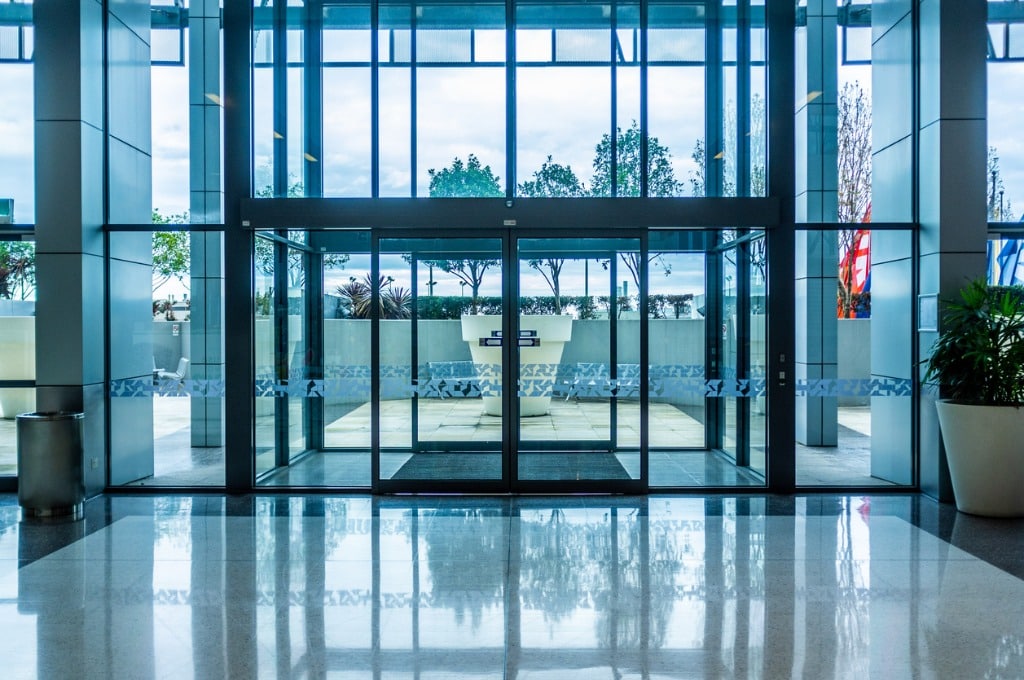
Throughout our everyday life, we encounter automatic doors on a regular basis. Automatic doors are so common that we might not even notice them. We take it as a given that automatic doors will work properly and safely.
Unfortunately, just like any technology, automatic doors can and do malfunction. When this happens, they can pose a danger to the public (especially the handicapped and the elderly). Even if they are not particularly heavy, being struck unexpectedly by an automatic door can easily cause someone to fall over, sometimes causing severe injuries.
Automatic doors operate using various sensors that are intended to notice a person’s movement and presence. A sensor that detects movement is called a “motion sensor” while one that senses objects or people that are not moving are called “presence sensors.” These sensors are often located at the top of the doorframe (both on the inside and the outside) and on the side of the door itself. If working properly, these sensors will recognize that a person or object is within their range and operate the door accordingly. However, for a variety of reasons, these sensors can malfunction.
The most common cause of a sensor malfunction is preventable. Unfortunately, problems with sensors are often caused by a lack of maintenance by the person or company who operate the premises. On the long list of responsibilities property owners have, automatic door maintenance is often times low on the list. This is unfortunate because the general maintenance and tests needed to ensure the safety of an automatic door is not complicated. Often times, doors malfunction simply because the sensors are dirty and need a wipe with a cloth.
There are tests that the owners of property that contain automatic doors should be running on a daily basis. These minimum safety checks have been created by the American Association of Automatic Door Manufacturers. The list of safety checks are usually affixed to the inside door frame of the automatic door. They are not complicated (they include walking towards the door to ensure it opens and standing in the swing area of the door for 10 seconds to ensure it doesn’t when someone is in the swing path).
If you or a loved one are struck by an automatic door, what should you do?
- Take Pictures of the Door and the Surrounding Area: As mentioned above, dirt or debris can cause sensors to malfunction on automatic doors. If able, you or a family member should take pictures of the door, its frame, any sensors and the surrounding area as close in time to the incident as possible. It is only after an incident occurs that many property owners decide to pay attention to the function of their automatic doors. By taking photos, you have evidence of the conditions of the door at or near the time of the incident, so if there is any subsequent adjustments or clean up in the area of the door, you still have something that clearly shows the state of the door.
- Get Contact Information from any Witnesses: Unlike a car accident, where the fact that an accident occurred is not usually in dispute, a property owner might dispute that you or your family member were struck by a door at all. Especially with the elderly where falls can happen for a multitude of reasons, it is important you try to get the contact information of anyone who saw the incident or the immediate aftermath. Don’t expect that the property owner will have a video of the incident or properly documented incident reports. Especially in stores, many of the video cameras are pointed inside (for loss prevention purposes), so a fall that happens while exiting the store might not be caught on camera. To be safe, it is best to take matters into your own hands, so that if you do decide to bring a lawsuit, you have independent witnesses who can at least confirm that the door did strike you or your loved one.
- Take a Video of the Door’s Function – If able, try to get a video of how the door functions. Obviously, if you were the one struck by the door, you are likely unable or not particularly keen on going into the path of the door again. However, if a family member or friend is able to film themselves using the door, it can become invaluable evidence in any future legal proceeding. Film the door to see if it is malfunctioning. Look for how long it remains open after someone walks through it and observe how fast it closes. If safe, have someone wait or stand in the path of the door to see if the door closes on them. If it does and you can get it on video, it is clear evidence of malfunction.
It is important to get a video of the door’s function as soon as practically possible. Once an incident occurs, the property owner might complete maintenance on the door or even replace it, so to have a video of its function around the time of the incident is helpful to have if a lawsuit is brought.
- Contact a Personal Injury Lawyer – the sooner you can reach out to a lawyer, the better. An experienced personal injury lawyer will be able to ensure that all the required evidence is preserved and will handle the day to day management of your case. With someone in your corner, you or your loved one can just focus on getting better.
If you or a loved one have been struck by an automatic door, or you have any questions about what steps to take if you are struck, please contact Daniel Fisher, personal injury lawyer, by phone at 416 644 2080 or email at dfisher@hshlawyers.com; or contact Michael J. Henry, Founding Partner, by phone at 416 361 0889 or email at mjhenry@hshlawyers.com.






